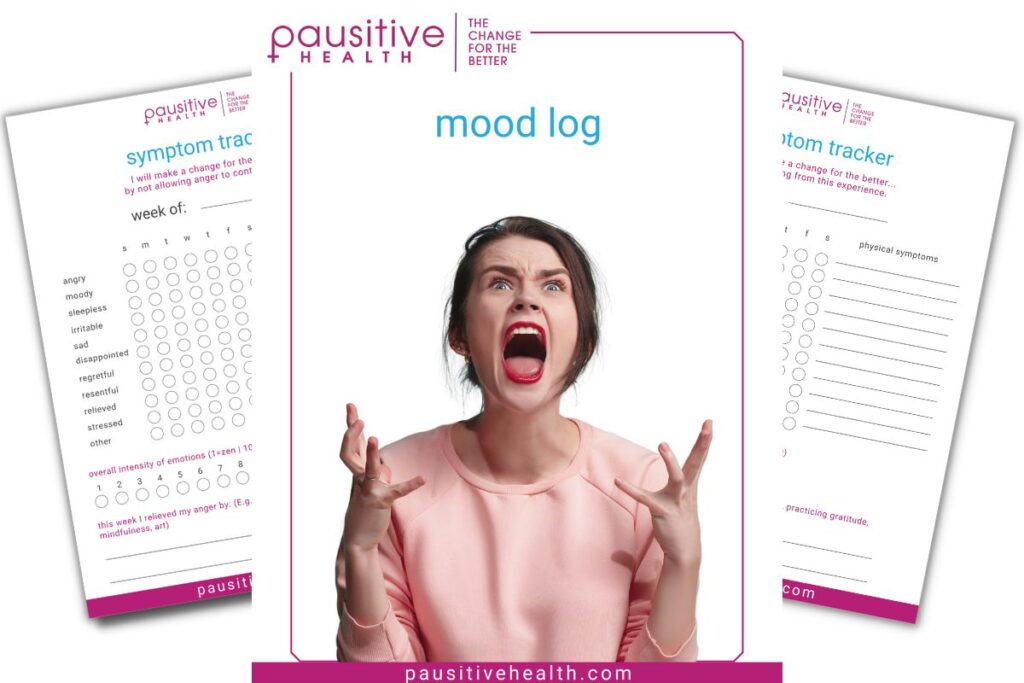How do you feel about your husband’s support, or lack thereof, during menopause? Menopause anger is a common symptom, and sometimes it’s directed toward the person you may love the most – your husband or significant other. If your body is tense and your jaws are clenched much of the time or you often feel anger deep within your soul, transform that energy into the momentum that will help you remember the joy and happiness that your husband usually brings to your life. It may be just the time to go all out to rekindle the feelings that brought you together in the first place. Don’t let menopause tear you apart.
Angry with your husband? How to love again
During menopause, you may become irritable, experience mood swings, or suddenly go into a fit of rage, even if you’ve typically been a mellow personality. Often, these emotions are directed at the person and people you may love most – your husband/partner, and family.
If you start feeling angry toward your husband while going through the menopausal transition, you are not alone. Many women experience what can seem like uncontrollable emotions that come out of nowhere, and there are ways to get off the rollercoaster.
Anger and rage are powerful emotions that can catch you off guard during menopause, especially if you haven’t experienced these feelings so strongly before.
A few things may be happening – you may have grown apart because you’ve been too focused on other things and haven’t spent enough time working on your relationship. The menopause journey may be the wake-up call you need to focus more on your relationship, especially if it’s been neglected over the years.
You may wonder how you can love amidst so much anger toward a person, especially when it’s a person you’re supposed to love so deeply. Love and anger are deeply intertwined.
As Tim Keller writes, “Anger is the result of love.”
Anger is a secondary emotion that can be triggered by vulnerability, fear, jealousy, or feeling threatened.
Understandably, the hormonal transition is a vulnerable time.
Women experience menopause physically, mentally, and emotionally.
Your anger may not be with your husband, but he becomes the target because he’s in the vicinity regularly. We often vent to those we love because we feel we have more leeway and will be given more grace.
You may be angry you’re at this inevitable stage in life, worried about the unknowns, mad that you’re aging, or grieving the loss of your reproductive years, even if you aren’t truly interested in having a baby.
You may also be experiencing reduced self-esteem due to changes in your body and taking that frustration out on others. In a pausitive health survey, women said weight gain was a top concern.
By midlife, ten or twenty extra pounds may have crept on, and losing that excess weight is difficult.
Menopause anger toward husbands is a real thing, but we’re going to help you – make a change for the better.
Is your husband angry at you?
As much as menopause impacts a woman, it also affects those around you. Husbands can also get angry at their wives during menopause. While you may be directing anger at your husband during menopause, he may be directing some of it back at you as well.
Love is a two-way street.
He may miss “the old you” – whether that was having a greater sex drive, being a calming presence, or focusing more on him.
Deep down, it’s not uncommon to find male anger rooted in feeling like a failure as a man.
He may feel he can’t “fix” menopause or physically satisfy you any longer, even though it’s affecting you physically, mentally, and emotionally.
That’s why it’s critical to have an open discussion about how you’re feeling, including why you may not be interested in sex or now find it painful due to vaginal dryness, as just one example.
9 ways to a better menopause marriage
There are at least 9 ways to manage anger toward each other during menopause.
A survey found that men don’t always connect the dots or realize some of the changes they see may be unrelated to menopause. Or perhaps aren’t personal.
- Have an honest conversation. Get personal by, writing a menopause letter if necessary.
- Validate each other’s feelings.
- Tell him you don’t expect him to “fix” your menopause journey, even though you’re in it together.
- Be open to working on your anger.
- Understand it.
- Release it.
- Embrace change and try new things.
- Live in the moment
- Reconnect sexually
- Reconnect emotionally
- Reflect on self-love

Have an honest conversation
First and foremost, be honest with your husband about what you’re going through and how you feel.
Don’t expect he’ll know you’re in menopause. While most men likely suspect something is happening, they don’t always know it’s menopause.
In a study of men aged 50-69 years old with a female partner with one or more menopause symptoms, men didn’t always correlate symptoms with menopause.
Be specific with your husband. He may need to be told your symptoms are menopause-related. Don’t assume he’s making the connection or even knows the symptoms of menopause.
Don’t be ashamed or embarrassed by how or what you’re feeling. Menopause is a natural stage of life. If your symptoms are causing disruption, there are things you can do to address them.
There are ways to transform your anger into a positive force for change – change within yourself and your relationship!
Write a menopause letter to your husband
Do you find yourself following the Love-Hurt-Anger Cycle? To get back to love, you have to deal with every part of that cycle – love, hurt, and anger!
Write a letter if you feel you’ve tried to talk to your husband but haven’t gotten through. Some women also find it cathartic to get their feelings out on paper.
If the anger and rage feel uncontrollable – express that!
For some, it also may be easier than a face-to-face conversation, especially if you’re embarrassed by weight gain, mood swings, anger/rage, hot flashes, restless leg syndrome, or other menopausal symptoms.
A letter can also be used as a tool if you feel your husband or partner doesn’t fully understand how profoundly the menopause journey can affect your life.
It may also be helpful because your partner doesn’t have to respond immediately in the moment. There’s an opportunity to process, get perspective, and decide how he will respond.
Validate each other’s feelings
If you write a letter, have a conversation later, so you can further an understanding between the two of you.
During this conversation, validation is vital, and it’s essential that it go both ways.
The key to genuine validation is active listening! Don’t just hear and be thinking about what you’re going to say while the other person is talking Really listen. Don’t interrupt.
Although you may disagree with each other’s perceptions, they are the reality of the person feeling them and give him the space to express himself.
- Don’t interject.
- Don’t get emotional.
- Don’t get defensive.
- Don’t try to “fix” the other person or offer advice.
It’s not totally about you or him at this moment. It’s about validating the other person’s feelings and how you are feeling when you are together.
Put yourself in the other person’s shoes and try to understand where they’re coming from and why they’re feeling a certain way.
Lead with empathy
Validate how the other person is feeling by reaffirming the feelings they have just expressed. Tell them you understand it must be frustrating to them for you to lash out with anger seemingly out of the blue.
Validate on the flip side, too. After your husband expresses his side of things, let him know how tough it is to go through so many changes and sometimes feel out of control of what’s happening to you.
And for him, this is not the time to tell you to live with the situation. That advice will not help the situation and is not validating.
Hopefully, he will let you know he is with you and wants to be as supportive as possible, including understanding when you’re exhausted, aren’t interested in sex, or are moody when you’ve not been in the past.
Validate, validate, and validate again!
Tell him you don’t expect him to “fix” the situation
Your husband may want to “fix” the situation. Men are often known as “fixers.” And think you expect them to do so.
But this stage of life isn’t about fixing. It’s about embracing it, managing symptoms, and growing from the experience.
Help him understand you can’t just stop the menopause journey overnight, even with hormones, which may take 2 – 3 months to fully have an effect.
However, it’s possible to manage symptoms, and there are options. Besides hormone therapy (HT), there are dozens of non-hormonal ways to help.
They include exercise, acupuncture, nutrition, cognitive behavioral therapy (CBT), or herbs to name a few.
Hopefully, he will want to support you, even without having a magical “fix.” If so, don’t expect him to “just know” what to do. Detail ways he can help you to avoid frustration for both of you.
Understand the anger
One important step in calming your anger is to understand it better. What triggers it? What coping strategies can you use when you feel the roar of your inner lion rising?
Accept how you’re feeling without judgment. Blame, or suppression, won’t help. It will make it more difficult to move forward.
Track your anger with an anger log. Identify what triggers it.
Is it something your husband does or says (or doesn’t do or say), or are you overwhelmed with work and life, and that energy then gets directed toward your husband?

Get Relief From Your Emotions
Having mood swings? Track how you feel, identify your triggers, and find ways to calm the emotional firestorm with this mood log.
"*" indicates required fields
Love and hormones are just two potential causes of your anger. Disappointment, regret, fear, or uncertainty may also be to blame.
Learn about each of the triggers and focus on managing each in the context of menopause.

Release the anger
When you’re angry, you often hear, “take a deep breath.” It’s a way of releasing anger in the moment.
It’s a better solution than yelling at the person you love.
It’s also better for your physical and emotional health than stress eating comfort food or drinking alcohol to self-medicate, two things that can actually make your menopause symptoms worse.
Findings reported by the American Heart Association in October 2022 indicated women younger than 55 who had experienced a heart attack had worse physical and mental health and worse recovery if there was severe marital stress compared to those in relationships with mild or no strife.
These outcomes held even after taking factors such as race, health insurance status, education level, employment status, and income and socioeconomic status. And women were more likely to report severe marital stress than their male partners.
So, don’t forget that deep breath. Long term, anger can take an emotional toll. Don’t let it hurt your health.
What else can you do? What about walking or running, listening to music, or engaging in a mind-body technique like yoga or mindfulness? You can also turn to journaling or a gratitude practice.
Many of these activities can be done alone, with a friend or work colleague, or with your spouse.
These are all great ways to release your anger so you don’t bottle up your emotions and then suddenly explode.

Embrace change
Just like a caterpillar, the menopause journey can be an amazing metamorphosis if you embrace this stage of life as a time for a better you.
Set yourself up for success by trying new things. Embrace the change and be open to new ideas and possibilities.
Just when I think I have learned the way to live, life changes.
~ Hugh Prather
Assess your treatment options, both those involving hormones as well as non-hormonal ones. Start with a conversation with your provider. If you have not been asked about the menopause journey, you may end up being the one to bring the subject up. If your physician does not seem prepared to help you find the solutions that are the best fit for you, you can search for someone who has had specific training in the management of the menopause journey. And don’t underestimate the major positive impact physical activity, healthy eating, and enough good quality sleep can have!
And now may be just the time to explore integrative modalities like acupuncture or herbal medicine.
Finally, try new things with your husband. If it’s been a while, get into a routine of date nights or mix up the routine in the bedroom.

Live in the moment
Embrace each moment of life. While it’s important to learn from the past and to prepare for the future, take the time to enjoy the present. Otherwise, your life will fly past, and you’ll wonder where it all went.
Don’t “should’ve, could’ve, would’ve” your life away.
You are on a journey, and this can be a time for renewal, for you and your relationship.
Find time to be spontaneous with your partner. Show him random acts of kindness and the kind of interest you had when you first fell in love. He’ll likely do the same in return.
If this is difficult, turn to a gratitude journal or mindfulness practice to kickstart living in the moment.

Love and sex
Is your sex life less than you’d like it to be? Perhaps you’re still really interested but not feeling good about your body due to weight gain or intercourse has become painful due to vaginal dryness. Or have you lost interest altogether?
Additional menopause symptoms like hot flashes and night sweats can make getting enough good quality sleep a challenge, and then there’s the fatigue that follows frequent sleepless nights.
So, sex may be the last thing on your mind.
Research shows sexual function worsens as you go through the menopause transition, which can last up to ten years.
Sexual desire decreases in 40-55% of women, followed by poor lubrication in 25-30% of women, and dyspareunia (pain just before, during, and after sex) in 12-45% of women.
It’s more than hormones at play. Psychological and relational changes in your relationship, which can be intertwined, also impact how successfully you experience (or don’t) sexual well-being.
But it’s an essential part of your relationship.
Reconnect sexually and emotionally
Your husband may not understand or know why you have a diminished interest in sex. Talk to him about the realities of having sex during menopause and the reasons why your desire may be lower.
Remember, hormone therapy (HT), including vaginal inserts, as well as lubricants, can help address some of the symptoms that now make your sex life less than satisfying.
Additionally, there are things he can do to get you in the mood for sex, including reassuring you he still finds you attractive and trying new things in a pattern that has become stale or rote.
Also, sex is just one form of love. And intercourse is only one type of sex. And sometimes simple human touch and holding each other closely is what you may need the most.
Find ways to connect on a deeper level. Remember, sexual arousal begins in the brain. Are you connecting emotionally to achieve another level of intimacy?
Work through your emotions and feelings to remember love again amidst your anger.
Get creative to reinvigorate or keep romance alive!
The menopause transition can be a mood swing rollercoaster so you may need more support and patience than ever before from your partner. It’s as important as sexual fulfillment.

Reflect on self-love
During menopause, self-love may be more challenging but is key to avoiding some of the bumps in the road of transition.
If you don’t already, take time for yourself. Find time to pause, reflect on where you are in life, and accept your life as it is in the present moment.
You may be ten pounds heavier. Most women in our pausitive health survey told us they struggled most with weight gain.
Don’t grieve for the past, when you were ten pounds lighter, or long for the future. You’re in menopause now, and you’re at your current weight. Take steps to reach and maintain a healthy weight, but accept who you are at this stage of your journey.
You can make a difference in how you feel by changing your mindset about menopause if the story you tell yourself is all doom and gloom. And, by the way, in some cultures and countries aging is respected and honored, and the word for menopause means transformation, renewal, and energy. Women who have that perspective also tend to have less severe symptoms.
Your mind, body, and soul will thank you. And your love life (and sex life) too!
I don’t love my husband
You may go through the changes the menopause transition brings to your relationship and conclude you don’t love your husband anymore.
If your marriage was on shaky ground before you entered the menopause journey, this stage of life may take you to the moment you realize you’ve been unhappy about how things were going for a while.
Talking to a therapist or going to marriage counseling may be a good option if you’re feeling this way, despite attempts to reconnect and rekindle your relationship.
Menopause and your partner
Although the focus has been on anger arising in a relationship between a man and a woman who are married, much of what’s been discussed is generally applicable regardless of your marital status. And since each situation is unique with its own dynamics, a major factor is the history and nature of the relationship before menopause entered the picture.
Things may be different, and potentially easier, in the case of a lesbian couple since each person will be on their own menopause journey at some point. Of course, if they are experiencing the menopause transition at the same time and symptoms are moderate to severe, the situation may bring its own set of challenges.
Remembering love during menopause
You can remember and renew love again during menopause. You didn’t arrive at anger overnight. And contributing factors beyond the hormonal changes and symptoms that accompany the journey for many women may have been present beneath the surface, either being ignored or suppressed for years.
Menopause may become a tipping point that brings all these emotions and patterns to the surface and forces you to face them.
It’s a journey. Give yourself grace and take the time to reconnect with yourself and your husband to reach what you really want in your relationship, now and in the future.
Parish SJ, Faubion SS, Weinberg M, Bernick B, Mirkin S. The MATE survey: men’s perceptions and attitudes towards menopause and their role in partners’ menopausal transition. Menopause. 2019 Oct;26(10):1110-1116. doi: 10.1097/GME.0000000000001373. PMID: 31188286; PMCID: PMC6791510.
Marital stress linked to worse recovery after heart attack | American Heart Association
Find a Menopause Practitioner | The North American Menopause Society
Scavello I, Maseroli E, Di Stasi V, Vignozzi L. Sexual Health in Menopause. Medicina. 2019; 55(9):559. https://doi.org/10.3390/medicina55090559
You may also like…

Reignite Passion: How To Manage Genitourinary Syndrome Of Menopause (GSM)
Are you experiencing vaginal dryness, no orgasm, or painful sex? If you wait or don’t have sex, it can get worse. Try these menopause treatments.

Menopause Rage Is Real! How To Tame The Beast Inside
Do you feel menopause rage? Learn how to tame the beast inside and control your emotional symptoms, including anger, during menopause.

The Top 6 Ways To Manage Your Anger And Feel Love Again
How do you manage your anger and feel love again, when you’re hormonal due to menopause? Try these techniques to rekindle your relationship.

